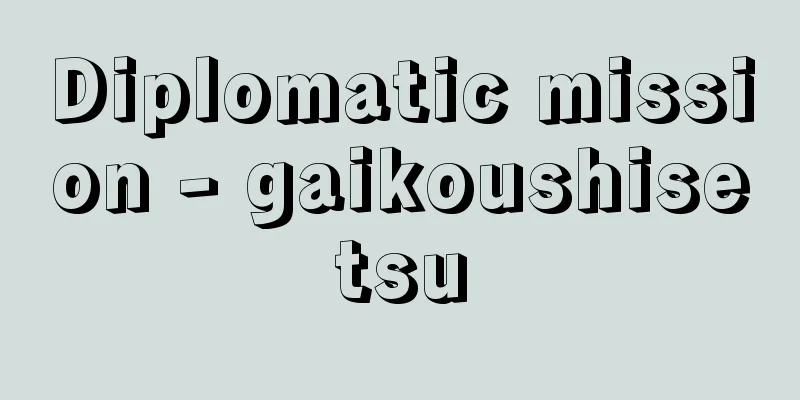Diplomatic mission - gaikoushisetsu

|
A national institution tasked by a sending country with acting in that capacity on behalf of its state. There are two types of diplomatic missions: extraordinary and permanent. International law on diplomatic missions has long been formed as customary law, but it has been codified in the form of general treaties with the adoption of the Vienna Convention on Diplomatic Relations in 1961 and the Convention on Special Missions in 1969. Historically, diplomatic missions began as temporary missions, and their origins date back to ancient Egypt, Greece, and Rome. The missions of temporary missions are specified each time they are dispatched, but they can be broadly divided into political or administrative missions, which are sent to diplomatic negotiations or international conferences with political missions, and ceremonial missions, which are sent to foreign ceremonies on behalf of a nation. On the other hand, it is said that the first permanent diplomatic missions were established among Italian city-states in the late Middle Ages, but they became common among European countries in the second half of the 17th century, and international laws regarding precedence, rank, privileges, etc. were gradually formed along with this. Regarding the rank of permanent diplomatic missions, rules were established by the powerful countries of the time at the Congress of Vienna in 1815 and the Congress of Aix-la-Chapelle in 1818, and all countries have followed these rules ever since. According to these rules, there are four ranks of envoys: ambassador, minister, minister-in-charge, and charge d'affaire. However, the term minister-patent is rarely used these days, and the Vienna Convention adopted in 1961 abolished this rank. The establishment of diplomatic relations and the rank of diplomatic envoy to be sent are all decided by agreement between the sending and receiving countries, but ambassadors are often sent between major powers and countries with close interests. Recently, each country has tended to send envoys with the rank of ambassador. The order of precedence among envoys of the same rank is determined by the general practice in the receiving country, either by the order of the date of presentation of credentials, or by the order of the date of notification of arrival to the Ministry of Foreign Affairs of the receiving country and the presentation of copies of credentials to the Ministry of Foreign Affairs. However, the rank or rank of an envoy does not affect the duties or privileges of the envoy. The main functions of a permanent diplomatic mission are: (1) to represent the sending country in the receiving country; (2) to protect the interests of the sending country and its nationals in the receiving country within the limits of international law; (3) to negotiate with the government of the receiving country; (4) to ascertain by all lawful means the state of affairs in the receiving country and to report thereon to the government of the sending country; (5) to promote friendly relations between the sending and receiving countries and to develop economic, cultural and scientific relations between the two countries. To carry out these functions, a diplomatic mission is accompanied by diplomatic staff, administrative and technical staff, and service staff, which together make up a mission. The diplomatic mission is none other than the head of the mission. The diplomatic mission and the diplomatic staff are called diplomats. A diplomatic envoy is appointed by the sending country. However, the receiving country may refuse to accept an envoy for personal reasons. There is no need to specify the reason for refusal. However, refusal without reason or for unjust reasons will inevitably lead to international criticism, protests and retaliation from the sending country. In order to avoid disputes regarding the dispatch of a permanent diplomatic envoy, the sending country is required to seek the consent of the receiving country in advance, i.e., an agrément. A permanent diplomatic envoy is dispatched by letter of credentials, and its submission constitutes official acceptance. An extraordinary diplomatic envoy is often dispatched by letter of full powers. The duties of a permanent diplomatic envoy end when the envoy dies, voluntarily leaves, is forced to leave, or is recalled by the sending government. Recall may be at the initiative of the sending country or at the request of the receiving country. The former is done by the severance of diplomatic relations, the resignation or transfer of the envoy, etc., while the latter is done by the severance of diplomatic relations, improper or illegal behavior of the envoy, etc. If there is a change in the government or head of state in the sending or receiving country, the mission of the envoy will end unless the envoy submits new credentials within a reasonable period of time. Diplomatic envoys, members of a mission, and their families are granted various privileges and immunities. This is because, in order to smoothly carry out their missions, it is necessary to restrain the exercise of the national sovereignty of the receiving country and to protect and provide benefits to envoys and other personnel. These privileges and immunities are collectively called diplomatic privileges. In recent years, there have been many cases of what are considered to be abuses of diplomatic privileges, to the point that even reviewing them is becoming an issue. On the other hand, there have been many acts of terrorism and other infringements against diplomatic agents and other diplomats, and in 1973 the United Nations General Assembly adopted the "Convention for the Protection of Diplomats and Other Persons" (which came into force in 1977), which stipulated the prevention and punishment of such acts. [Yasuo Ishimoto] [Reference] |Source: Shogakukan Encyclopedia Nipponica About Encyclopedia Nipponica Information | Legend |
|
国家を代表して、その資格において対外的に行動する任務を派遣国によって課せられた国家機関。臨時外交使節と常駐外交使節の2種類がある。外交使節に関する国際法は長い間の慣習法として形成されてきたが、1961年には「外交関係に関するウィーン条約」が、また69年には「特別使節団に関する条約」が採択され、一般条約の形で成文化されるに至っている。 外交使節は歴史的には臨時外交使節から発達を始め、その起源は古代エジプト、ギリシア、ローマにさかのぼる。臨時外交使節の任務は、派遣に際して、そのつど特定されるが、大別して、政治的任務を帯びて外交交渉や国際会議に派遣される政治使節または事務使節と、国家を代表して外国の式典などに派遣される儀礼使節とがある。他方で、常駐外交使節が置かれたのは中世末期のイタリア都市国家間が最初だといわれているが、17世紀後半にはヨーロッパ諸国間で一般化するに至り、それにつれて、席次・階級や特権などに関する国際法がしだいに形成された。常駐外交使節の階級については、1815年のウィーン会議および1818年のエクス・ラ・シャペル会議において、当時の有力な諸国によって規則がつくられ、以来いずれの国もこれに従っている。それによると、使節には大使、公使、弁理公使、代理公使の4階級がある。もっとも弁理公使は、最近ではほとんど用いられなくなり、1961年に採択されたウィーン条約でも、この階級は廃止されている。外交関係を開設し、どの階級の外交使節を派遣するかは、いずれも派遣国と接受国の合意によって定まるが、大国間や利害関係の密接な国家間では大使の派遣されることが多い。最近では各国とも大使の階級の使節を派遣することが多くなっている。同一の階級の使節の間での席次は、信任状を提出した日付の順序によるか、または到着を接受国外務省に通告し、信任状の写しを外務省に提出した日付の順序によるかのいずれかで、接受国で行われている一般的習律によって決定される。もっとも、使節の階級や席次によって使節の職務や特権に差異が生じることはない。 常駐外交使節の職務として重要なものは、(1)接受国において派遣国を代表すること、(2)接受国において、国際法が認める範囲内で派遣国およびその国民の利益を保護すること、(3)接受国の政府と交渉すること、(4)接受国における諸事情をすべての適法な手段によって確認し、かつ、これらについて派遣国の政府に報告すること、(5)派遣国と接受国との間の友好関係を促進し、かつ、両国の経済上、文化上および科学上の関係を発展させること、とされている。これらの職務を果たすため、外交使節は、外交職員、事務および技術職員、ならびに役務職員を伴い、これらによって使節団が構成される。外交使節は、使節団の長にほかならない。外交使節と外交職員は、外交官とよばれる。 外交使節の任命は派遣国によって行われる。しかし接受国は、使節として派遣される者について、個人的な理由でその接受を拒絶することができる。かならずしも拒絶の理由を明示する必要もない。もっとも、理由もなく拒絶したり、不当な理由で拒絶したりするときは、国際世論の非難や、派遣国の抗議、報復を免れない。常駐外交使節の派遣についての紛議を避けるため、派遣国は、事前に接受国の同意、すなわちアグレマンを求めることとされている。常駐外交使節の派遣は信任状によって行われ、その提出によって正式の接受が成立する。臨時外交使節の派遣は全権委任状によって行われることが多い。常駐外交使節の任務は、使節の死亡、使節の自発的退去、使節に対する退去強制、派遣国政府による召還によって終了する。召還は、派遣国の発意によることもあれば、接受国の要求に基づくこともある。前者は、国交断絶、使節の辞任・転任などによって行われ、後者は、国交断絶、使節の不当または不法な行為などによって行われる。なお、派遣国または接受国において、政体や元首の変更が生じたときには、相当期間内に信任状を改めて提出しなければ使節の任務は終了する。 外交使節および使節団構成員ならびにそれらの家族については、さまざまの特権・免除が認められる。任務の円滑な遂行のためには、接受国の国権の行使が抑制され、使節などを保護し便益を提供することが必要だからである。これらの特権・免除を総称して外交特権という。最近では外交特権の乱用とみられる例も多く、その見直しさえ問題となるほどである。他方で外交使節など外交官に対するテロなどの侵害行為も多く、1973年に国連総会は「外交官等保護条約」を採択し(77年発効)、その防止と処罰について規定した。 [石本泰雄] [参照項目] |出典 小学館 日本大百科全書(ニッポニカ)日本大百科全書(ニッポニカ)について 情報 | 凡例 |
<<: "Kaikosha Articles" - Kaikosha Articles
>>: Crab-traveling man - Kaiko Sanjin
Recommend
Kanchiin Kongozo Shogyo
...Goho, the first head priest of this temple, wa...
Ando Sekiten
At the Yalta Conference in February 1945, the All...
Ogawa Ueharu
...Refers to an area on a site that is planned fo...
Profit-making class
… [Plural Class Theory] M. Weber proposed a plura...
Shigetaka Itakura
1667 * -1713 A daimyo from the early to mid-Edo p...
Puyuma
...In general, there are few linguistic documents...
Tagarasi (English spelling) Celery-leaved ache
A biennial plant of the Ranunculaceae (APG classi...
cotton-wool patch
… Vitiligo is classified into soft and hard exuda...
Speaking ability
...In criminal proceedings, the idiom used to ref...
Ishida Mitsunari
Year of death: October 1, 1600 (November 6, 1600) ...
Imperial Seal - Rice Menu
A direct letter in the form of a gokyosho, to whic...
Oil-sealed rotary vacuum pump
A vacuum pump that prevents leakage by sealing a s...
Lake Usoriyama
Lake Osorezan is a crater lake (caldera lake) of M...
Vienna
…It is the capital of Austria and one of the nine...
Reverse dilution method
…It is extremely difficult to quantitatively sepa...









